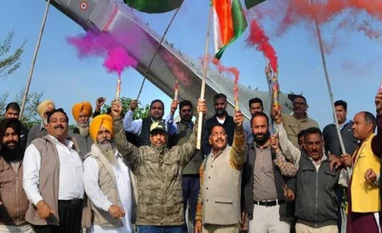Has anything changed after bombing of a terror camp in Pakistan by IAF?
Eventually, terrorism against India will be restored, possibly in more virulent forms, either unclaimed or, more likely, under 'domestic' fronts.
)
ajai
Listen to This Article
Crippling pressure is the way forward
The aerial strikes targeting the Jaish camp at Jaba, in retaliation to the Pulwama suicide bombing, were certainly unprecedented. The primary justification for the strikes, despite the ludicrous diplomatese of ‘non-military pre-emptive strikes’, was, first, vengeance; and second, deterrence.
It is increasingly apparent that any claims of disproportionate ‘vengeance’ having been exacted have been vastly exaggerated, and at least some independent evidence that the aerial strikes entirely missed their mark.
As for deterrence, despite Imran Khan’s ‘statesmanlike’ postures and offers of peace, and the hysterical claims of some Indian TV anchors that Pakistan has been brought to its knees, ‘forced’ to release Group Captain Abhinandan Varthaman as a result of the dread inflicted by India’s incomparable daring, it is useful to notice that there has been significant escalation in ceasefire violations (with at least 43 recorded at the time of writing, according to reports, in the last four days) in Jammu & Kashmir. This should give some indication, at least, that Pakistan’s intent remains entirely unchanged. And, apart from some mollifying statements and blunt denials, there is no reason to believe that Pakistan has taken any concrete action to bring the terrorist groups operating from its soil under any new restraint.
Tactical operations – including numberless aerial and drone strikes by the US against terrorist targets in Pakistan – have failed comprehensively to bring Rawalpindi to heel, and to expect that a single Indian operation at Balakot will produce a dramatically different outcome is pure fantasy.
Also Read
What then is to be expected? A brief withholding of the more overt patterns of terrorist action in India by Pakistani groups; more pretence of ‘statesmanship’; refining the art of the ‘minimal satisfier’ – in which Pakistan has established long mastery – while Pakistan’s ministers nurse Masood Azhar, who, we have been informed, is ‘unwell’.
The terrorist facilities in Pakistan are likely to be driven deeper underground – and will not be located atop a particularly visible geographical feature like Jaba. Also, there have been purported ‘takeovers’ of terrorist facilities by state agencies – as has been done with Jaish’s Bahawalpur headquarters – in the wake of the Pulwama attack.
Eventually, terrorism against India will be restored, possibly in more virulent forms, either unclaimed or, more likely, under ‘domestic’ fronts.
This will continue to be complimented and compounded by relentless ‘ceasefire violations’ and, as a direct consequence of the Balakot strike and subsequent developments, likely by periodic aerial skirmishes, all of which will cause purposeless loss of life on both sides.
Essentially, the more things change, the more they are the same.
Only when crippling pressure is brought to bear on Pakistan can this change. But this will require a sustained strategy, employing every instrumentality of state power, coordinated over the long term. The Indian state has shown no appetite for such engagement.
Disclaimer: These are personal views of the writer. They do not necessarily reflect the opinion of www.business-standard.com or the Business Standard newspaper
More From This Section
Topics : Terrorism
Don't miss the most important news and views of the day. Get them on our Telegram channel
First Published: Sep 25 2024 | 7:01 PM IST
